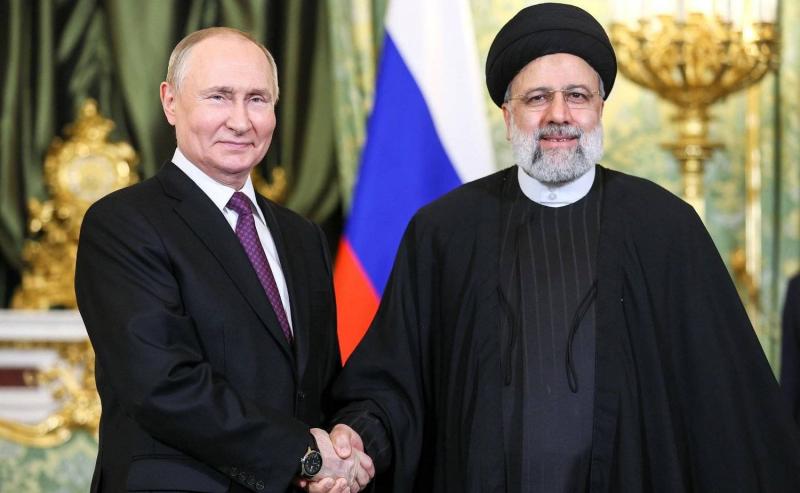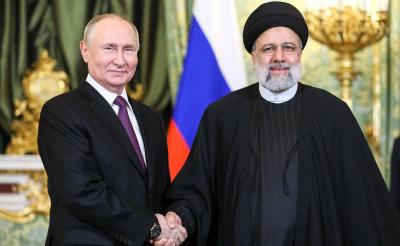It can be said that the beginning of Russian-Iranian relations was characterized by significant oscillations due to their profound differences and gradual détente in their relationship. Initially, Russia's relations were somewhat restrained due to its ties with the West. However, after 2014, the relationship began to improve gradually as the confrontation and sanctions against Russia escalated, leading to more intense development of Russian-American relations. It seems that the Russian-Iranian relationship has been influenced by a message from Imam Khomeini directed at the Soviet Union at the beginning of Gorbachev's presidency, calling for a conversion to Islam, and President Vladimir Putin appears to have committed to this message, steering Russia towards Iranian Islam.
The development of Iranian-Russian relations can be traced back to the election of President Hassan Rouhani in 2013, which marked the beginning of a serious turn in their relations. On September 13, 2013, the leaders of the two countries met in Bishkek (Kyrgyzstan) and expressed their intentions to enhance bilateral relations to facilitate the export of Iranian oil to Russia in exchange for importing goods from Russia. In early 2014, the two countries engaged in trade talks expected to reach a value of $20 billion.
Moreover, the tightening of Western sanctions on Russia amidst deteriorating military and political conditions in Ukraine has pushed Russia towards Iran, potentially strengthening their relations, including military cooperation. Indeed, Iranian Foreign Minister Mohammad Javad Zarif visited Moscow multiple times over the past two years, the last of which was in August 2015. The signing of the nuclear agreement in Vienna between Iran and the United States has not yet highlighted its impact on Iranian-Russian relations, hence it is essential to assess the contributions from political, economic, and military perspectives to determine the future of Russian-Iranian relations and the motivations behind them.
While many observers see significant negative implications for Russia in the negotiations and their impact on the agreement, the question remains: Did Moscow actively facilitate the agreement? Russian proposals significantly contributed to defining the final shape of the signed agreement and were successful in negotiations by successfully implementing the "concept of gradualism and reciprocity" proposed by Russian diplomats, representing a step for Iran towards compliance, accompanied by a reciprocal step from the 1+5 group and the UN in easing international sanctions.
Despite the collaboration between Iran and Russia, several differences have emerged based on conflicting interests and various disputes, including: the division of the Caspian Sea and its oil and gas resources, the Iranian nuclear program, competition in Central Asia, and the Syrian issue.
Amidst the Russian-Iranian understanding, the depth of their disagreements has begun to surface publicly. A leaked audio recording of Iranian Foreign Minister Mohammad Javad Zarif from April 28, 2021, criticized the influence of the "Revolutionary Guard" on the country’s foreign policy, particularly regarding its engagement in the Syrian civil war at the behest of Russia. Zarif also insisted that Russia opposed the "Joint Comprehensive Plan of Action" and worked closely with the "Quds Force" to undermine the nuclear agreement, even though it had assisted in negotiating its terms. He views Russia's policy as one aimed at ensuring that Iran remains the primary challenge to Washington in the region, thereby diverting American attention from Moscow.
Tensions escalated following the sixth ministerial meeting of the strategic dialogue between Russia and Gulf countries held in Moscow on July 10, 2022, where Russia supported the Gulf's position on three disputed islands between Tehran and Abu Dhabi in the Persian Gulf—Greater Tunb, Lesser Tunb, and Abu Musa. Tehran did not stop at statements but escalated its rhetoric against Russian policy. Khamal Kharrazi, head of the Strategic Council on Foreign Relations, received the Japanese ambassador to Tehran and urged both Moscow and Tokyo to resolve their disputes through dialogue regarding the contested Kuril Islands. This came amid calls from various Iranian circles for their government to penalize Moscow for crossing what they termed "red lines," particularly regarding Russia's occupation of neighboring territories and its attempts to alter geographical borders. Iranian diplomat and former ambassador to the UK Jalal Sadatian reminded Moscow of its annexation of Crimea and support for the secession of South Ossetia and Abkhazia from Georgia, urging the Iranian Foreign Ministry to exploit these factors as they represent vulnerabilities for Russia and reassess relations with it, especially concerning the Russian war on Ukraine and condemnation of attempts to annex parts of Ukraine.
Regarding missile and drone arms deals, Iran has reached an agreement with Moscow to purchase Su-35 fighters. Despite the passage of time since this agreement, Tehran has not yet received any of these aircraft and later determined it could produce domestically manufactured fighters. Russian Defense Minister Sergey Shoigu, during his visit to Tehran, stated that Russian-Iranian relations have reached a new level despite opposition from most Western countries, emphasizing that Russia "aims to implement a comprehensive range of planned activities despite U.S. and Western opposition." According to Shoigu, "the pressure of sanctions on both Russia and Iran shows its ineffectiveness, while Russian-Iranian interaction reaches a new level," indicating that the defense relationship between Russia and Iran is developing dynamically and positively. Recent high-level meetings have increased significantly.
It appears that Russia is working to enhance its defense cooperation with Iran, and it has received hundreds of attack drones used in operations against Ukraine. Following the Ukraine war, a new relationship has emerged between President Vladimir Putin and Ibrahim Raisi amidst Western sanctions. The White House released declassified information on July 9, 2023, indicating that drones manufactured in Iran were shipped across the Caspian Sea to Russian forces using them in Ukraine.
Despite the extensive relations between Iran and Russia, military cooperation in Syria for more than a decade, mutual high-level visits, and their commitment to open a new chapter in bilateral relations through an imminent long-term strategic cooperation treaty, recent disagreements have surfaced, becoming a notable feature of the current phase amid increased Iranian diplomatic activity towards Moscow. It is noteworthy that the United States is particularly disturbed by Iran's actions and its alignment with Russia despite efforts by the current U.S. administration to extend concessions to Iran.
The military support from Russia, especially in drone capabilities in the war against Ukraine, has unsettled the United States and also irritated European Union countries, which insisted on continuing the nuclear agreement because they are part of it. However, supplying Russia with drones and weapons to strike an adversarial European country that they are interested in rebuilding with their funds threatens European national security, prompting the West to tighten sanctions against Iran, which has become increasingly tied to Russia.
Iran may have attempted to closely align with Russia and connect its fate to it as leverage against the United States, aiming for concessions, as its focus remains on the U.S. while its connections are limited to the Russian basket. Especially after the "Al-Aqsa Flood" operation and the opening of multiple fronts, Tehran sees that its salvation lies in Washington through offering concessions, as Russia no longer has the capacity to support Iran in substantial ways.
### Trade Between the Countries to Circumvent Sanctions
Importantly, Russian President Putin visited Tehran on June 21, 2022, a few months after the invasion of Ukraine, seemingly trying to send messages to the West that the Iranian-Russian alliance would be directed against the West amidst the sanctions imposed on both. Russia and Iran are key oil and gas producers, and they could devise a strategy to exacerbate economic damages inflicted upon the West by limiting their fuel supplies while ensuring the price of their exports rises—prices that must be paid by Western countries seeking to isolate them.
After years of discussions, Tehran and Moscow signed an agreement on May 17, 2023, to establish a railway linking two cities in northeastern Iran, Rasht and Astara, bordering Azerbaijan and overlooking the Caspian Sea. This agreement facilitates a land trade route between Southeast Asia and Northern Europe and is part of the "International Transport Corridor between North and South" (known as the "North-South Corridor"), signed in the early 2000s among Russia, India, and Iran, allowing the transport of goods from the first through the second via the territories of the third.
Thus, enhancing mutual cooperation to circumvent Western sanctions imposed on each is achieved by signing an agreement to expedite the establishment of a crucial segment of a railway network that will accelerate goods transport and make it possible to bypass major sea routes, notably the Suez Canal. On September 22, with Russian support, Iran received approval in Samarkand, Uzbekistan, for permanent membership in the Shanghai Cooperation Organization, with Iranian Foreign Minister Hossein Amir Abdollahian and the Secretary-General of the Shanghai Organization signing the agreement.
Trade volume between Iran and Russia grew by 81% in 2021, reaching nearly $4 billion, an all-time high. In the first quarter of the year, trade rates rose by more than 10%. Numerous commercial and industrial contracts have been signed for potential projects in Shiraz, including involving Russian specialists in expanding the metro, oil and gas supply exchanges, and establishing drone manufacturing in Russia. Additionally, reviving transactions in Iranian riyals against Russian rubles has not yet elevated the external trade volume to the desired level, making evident attempts to circumvent the international sanctions imposed on both economies.
Moreover, there are ongoing infrastructure projects in Iran regarding gas pipelines that have become direly inadequate. Russia, with its extensive experience in natural gas exploitation and pipeline construction, stands ready to participate in large gas projects in Iranian territory. Lastly, opportunities are not limited to massive state-owned enterprises in Iran post-sanctions but will also be appealing for wealthy businesspersons globally, including Russians who previously explored the Tehran stock market.
Regarding the future of Iran-Russia relations, it depends on the transformation of both internal and external environments. Over the past two decades, it is clear that Moscow engages with Iran according to a policy of separating issues.




